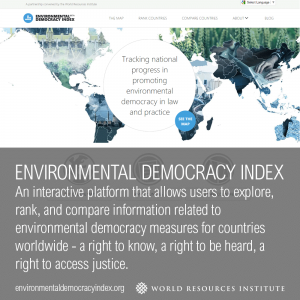Event
The Environmental Democracy Index

Access to information, public participation and access to justice are determinant to achieve sustainable development. To advance measuring progress in countries around the world towards strengthening access rights, The Access Initiative and the World Resources Institute launched the first Environmental Democracy Index (EDI), based on an internationally recognized set of guidelines, on 20 May 2015.
The Index offers new insights into the state of environmental democracy around the world and is the first to measure how well countries’ national laws protect environmental democracy rights. According to the developers, it is a tool that could support global policies to strengthen environmental democracy.
The index as of 20 May 2015 evaluates 70 countries, across 75 legal indicators, based on objective and internationally recognized standards established by the United Nations Environment Programme’s (UNEP) Bali Guidelines. EDI also includes a supplemental set of 24 limited practice indicators that provide insight on a country’s performance in implementation. The national laws and practices were assessed and scored by more than 140 lawyers around the world. Country assessments were conducted in 2014 and will be updated every two years. Scores are provisional until 30 August 2015 as results are being shared with governments and civil society for feedback until 15 July.
UNITAR and the Geneva Environment Network Secretariat organized an event presenting and discussing this new tool with the developers and key stakeholders, on Tuesday 9 June, at the International Environment House.
More information on the index available on the EDI website: environmentaldemocracyindex.org
AGENDA
Welcome and Introductory Remarks
Achim HALPAAP, Senior Manager, Environment and Green Development, UNITAR (moderator)
Jan DUSIK, Director, UNEP Regional Office for Europe
Presentation of the EDI
Lalanath DE SILVA, Director, Environmental Democracy Practice, WRI
Jesse WORKER, Manager, Environmental Democracy Index Project, WRI
Q&A
An Interactive Panel Discussion
Jan DUSIK, Director, UNEP Regional Office for Europe
Maria Cristina CÁRDENAS FISCHER, Chief, Technical Assist. Branch, Basel, Rotterdam & Stockholm Conventions Secretariat
Biruté ABRAITIENE, Minister Counsellor, Permanent Mission of the Republic of Lithuania to the United Nations Office in Geneva
Yves LADOR, Permanent Representative, Earthjustice
Marc HUFTY, Professor, Graduate Institute
Q&A
Discussion
- Notwithstanding some pragmatic limitations in the index methodology, the EDI serves as a crucial starting point for international and cross-cutting discussions between governments, civil society organizations and the broader population.
-
One of its goals is to bring together on a more permanent basis practitioners from governments and civil society to discuss implementation issues of internationally agreed norms such as Principle 10, the Aarhus Convention or the Bali Guidelines.
- One contentious issue raised was that formal compliance with procedural rules in environmental matters may nonetheless produce negative outcomes, highlighting the importance of qualitative assessments of legal and legislative procedures; Laws governing issues of access to information and public participation are in themselves no guarantee for good decision-making, but are rather to be seen as safeguards to reduce the chances of bad outcomes; such qualitative assessments exist in the EDI; however, they do not currently form part of the quantitative country scores.
-
All scores are validated in a comprehensive review process in which both governments and civil society get an opportunity to express their opinion and suggest adjustments.
-
All comments and reviews are made public unless WRI was asked to keep them confidential.
-
It was raised that substantive environmental rights such as the right to clean water, air, habitats are integral parts of environmental democracy; without them, indices such as EDI risk ending up as mere legal indices.
-
The democracy dimension seems to encompass a much broader notion than mere legal rules; for example, questions of representativeness and emancipation are not addressed properly in the EDI
- The name of the index refers to the “term of the art”, which crystallizes the contents of debate over the years, such as Principle 10, the Bali Guidelines etc.
- With regard to other indices, EDI can be an important complementary tool to be linked with other work and is not to be conceived as a substitute to other indices, e.g. Human Development Index (HDI).
-
In the next edition of EDI, a 100+ countries shall be included, also to achieve greater representation of certain regions, especially Africa.
- UNEP Regional Director, Jan Dusik, mentioned the qualitative importance of the index, and possibilities of linking it with UNEP Live. There is potential for capacity building between the countries searching for best practices for each guideline.
- As mentioned by Yves Lador, from Earthjustice, and various participants, score/ranking is not enough, dialogue behind infomration is very important.
https://www.genevaenvironmentnetwork.org/wp-content/uploads/2020/05/invitation_9_june.pdf
https://www.genevaenvironmentnetwork.org/wp-content/uploads/2020/05/edi_brochure_english_6_2015.pdf
https://www.genevaenvironmentnetwork.org/wp-content/uploads/2020/05/edi_brochure_french_6_2015.pdf
https://www.genevaenvironmentnetwork.org/wp-content/uploads/2020/05/biographies_9_june_2015.pdf
